Governments talk big about child care, but the struggle to find a spot is real, parents say
CBC
Sun, August 27, 2023
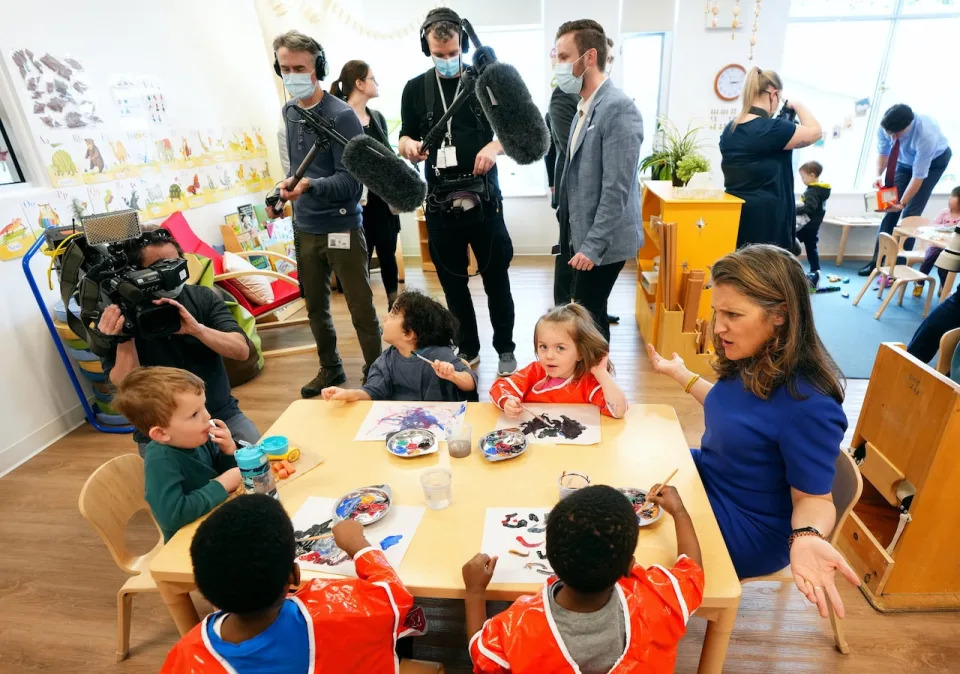
Minister of Finance Chrystia Freeland sits with children at a child-care centre in Ottawa on March 29, 2023. The federal and provincial governments have touted the benefits of early childhood education for years, but a shortage of spaces persists. (Sean Kilpatrick/The Canadian Press - image credit)
When Julie Jones, 46, had her daughter five years ago, she assumed she'd eventually enrol her in a licensed daycare centre.
Jones, a librarian at Simon Fraser University in Burnaby, B.C., felt that a group setting with other kids and trained adults would be the best option for her daughter.
She thought it might be tricky to secure a spot but figured her research skills would come to use.
"I have always thought, 'Oh it'll work out," she said. "I'll be able to figure it out."
Once her parental leave was over, reality set in. Despite putting her daughter on multiple wait lists, nothing was available.
"It was a really, really stressful time," she said.
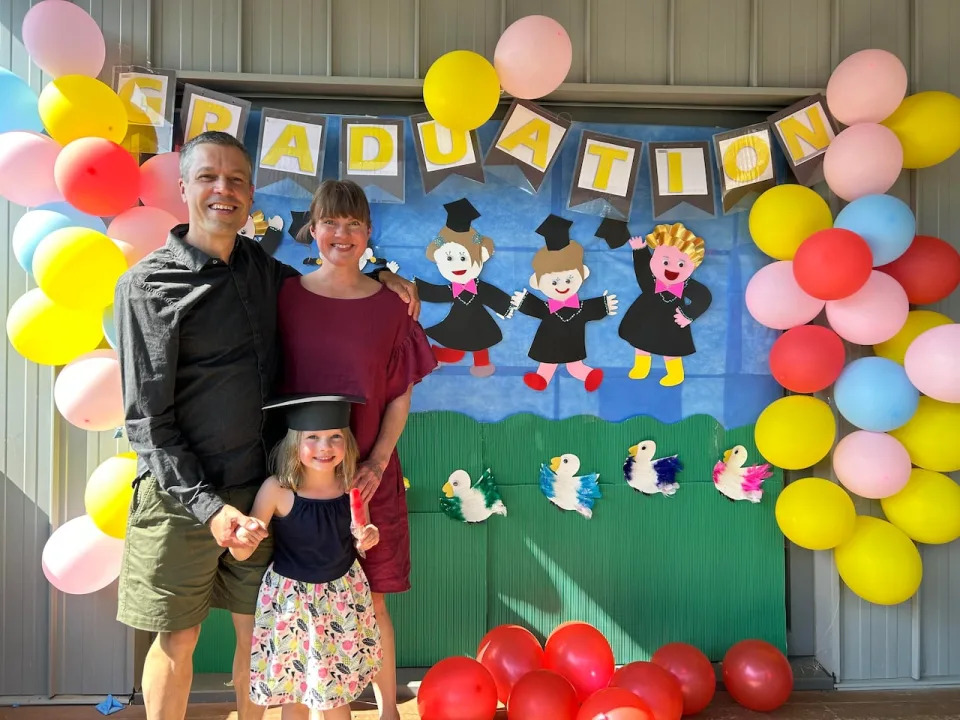
Julie Jones, 46, and her husband, Jared Wiercinski, 48, say they struggled to find child care for their daughter, and are now struggling again to find after-school care. (Submitted by Julie Jones)
In recent years, both the federal and provincial governments have frequently touted the benefits of licensed group child care and early childhood education.
Yet today in B.C., there are only enough licensed child care spaces for 25 per cent of children under 12, according to the Coalition of Child Care Advocates of B.C., with the toughest ages to serve being those under three, and school-age children who need before- and after-school care.
According to the Organisation for Economic Co-operation and Development (OECD), the average enrolment in early childhood education for children under two is 36 per cent in member countries, which include Canada.
For countries that provide universal early childhood education, nearly all children age three to five are enrolled in formal child care.
CBC News heard from parents who commuted an additional two hours a day to take their child to daycare, others who feared bringing up safety concerns for fear of losing their daycare spot, and others still who paid for months of care they didn't need to secure a place for their kid.
Sharon Gregson, provincial spokesperson for the $10-a-day child care campaign, says the difficulty of finding child care isn't new. What has changed in her 30 years as an early childhood education advocate is parents's expectations.
"Senior public health officials and senior government officials, both provincially and federally, talk about child care as an essential service," Gregson said.
The disparity between government talk and the availability of licensed child care, Gregson says, can be a harsh reality for parents when it comes time to start looking for care for their kids.
Thousands of new spaces
And yet there has been some improvement.
In a written statement, the B.C. Ministry of Education and Child Care said it has funded the creation of almost 32,000 licensed spaces since 2018, with more than 11,800 of these new child-care spaces now operational.
"There is still more work to do, but we are making progress on building access to child care as a core service that people can depend on because affordable, quality, inclusive child care is good for families, communities and the economy," said the ministry.

Child with puzzle.
Early childhood education experts say there is ample research to support the need and benefits of quality, affordable child care. (Tyson Koschik/CBC)
Gregson agrees there has been progress.
But she also points to countries like Germany, where all children age 12 months and above have a legal right to child care, which is subsidized. Children between age three and six are entitled to a place at preschool.
"We would never, ever expect that a child in British Columbia couldn't attend kindergarten or Grade 5 because there were no spaces or that their families couldn't afford a space," she said.
"That's how some countries look at early childhood education, look at child care as well, and that's where we need to move to."
Clear data
Laurie Ford, director of the early childhood education program at the University of British Columbia, agrees.
Ford says there is ample research to suggest that early childhood education helps young children with their emotional, cognitive and social skills.
"The data is quite clear that it is a foundation that launches you for success in life," she said.
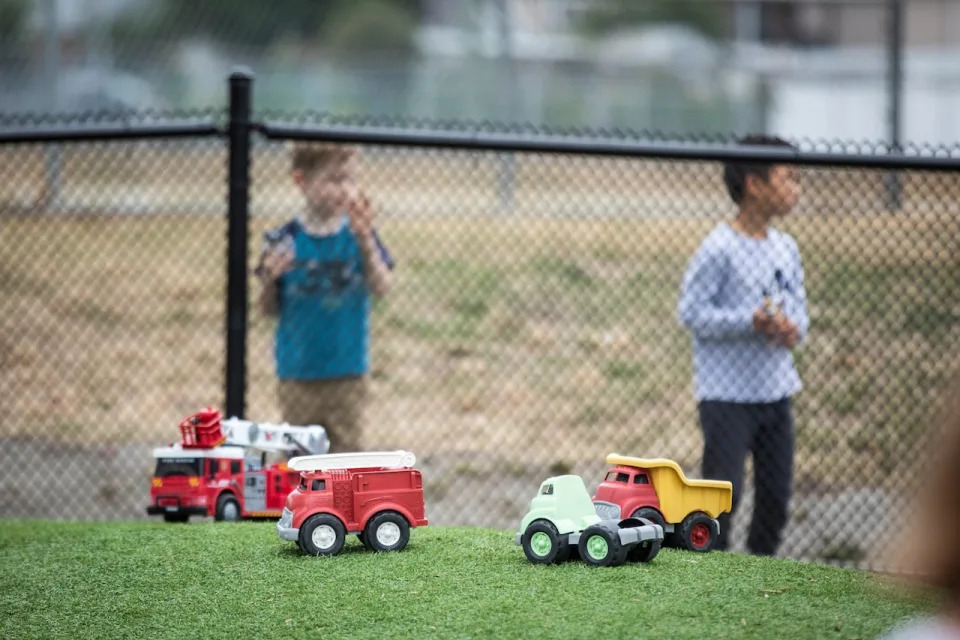
Kids are pictured playing at a child care space in Burnaby, British Columbia on Friday, September 23, 2022.
In B.C., there are only enough child-care spaces for 25 per cent of children under 12. For some age groups, according to the OECD, the need is as much as nearly 90 per cent. (Ben Nelms/CBC)
Although the province continues to invest in creating new child-care spaces, Gregson worries that progress may be stalled because of a lack of qualified early childhood educators.
"By fiscal 2027/28, 40,000 new spaces aren't going to happen. Even if they're built, there is nobody to work in them," she said.
The province said it has invested $540 million since 2018 to expand the number of training seats and bursaries for early childhood education students, fund professional development and peer mentoring supports, and increase wages by $4/hour.
According to WorkBC, the median income for an early childhood educators and assistants is about $20/hour, not including the province's $4/hour wage enhancement.
CBC
Sun, August 27, 2023

Minister of Finance Chrystia Freeland sits with children at a child-care centre in Ottawa on March 29, 2023. The federal and provincial governments have touted the benefits of early childhood education for years, but a shortage of spaces persists. (Sean Kilpatrick/The Canadian Press - image credit)
When Julie Jones, 46, had her daughter five years ago, she assumed she'd eventually enrol her in a licensed daycare centre.
Jones, a librarian at Simon Fraser University in Burnaby, B.C., felt that a group setting with other kids and trained adults would be the best option for her daughter.
She thought it might be tricky to secure a spot but figured her research skills would come to use.
"I have always thought, 'Oh it'll work out," she said. "I'll be able to figure it out."
Once her parental leave was over, reality set in. Despite putting her daughter on multiple wait lists, nothing was available.
"It was a really, really stressful time," she said.

Julie Jones, 46, and her husband, Jared Wiercinski, 48, say they struggled to find child care for their daughter, and are now struggling again to find after-school care. (Submitted by Julie Jones)
In recent years, both the federal and provincial governments have frequently touted the benefits of licensed group child care and early childhood education.
Yet today in B.C., there are only enough licensed child care spaces for 25 per cent of children under 12, according to the Coalition of Child Care Advocates of B.C., with the toughest ages to serve being those under three, and school-age children who need before- and after-school care.
According to the Organisation for Economic Co-operation and Development (OECD), the average enrolment in early childhood education for children under two is 36 per cent in member countries, which include Canada.
For countries that provide universal early childhood education, nearly all children age three to five are enrolled in formal child care.
CBC News heard from parents who commuted an additional two hours a day to take their child to daycare, others who feared bringing up safety concerns for fear of losing their daycare spot, and others still who paid for months of care they didn't need to secure a place for their kid.
Sharon Gregson, provincial spokesperson for the $10-a-day child care campaign, says the difficulty of finding child care isn't new. What has changed in her 30 years as an early childhood education advocate is parents's expectations.
"Senior public health officials and senior government officials, both provincially and federally, talk about child care as an essential service," Gregson said.
The disparity between government talk and the availability of licensed child care, Gregson says, can be a harsh reality for parents when it comes time to start looking for care for their kids.
Thousands of new spaces
And yet there has been some improvement.
In a written statement, the B.C. Ministry of Education and Child Care said it has funded the creation of almost 32,000 licensed spaces since 2018, with more than 11,800 of these new child-care spaces now operational.
"There is still more work to do, but we are making progress on building access to child care as a core service that people can depend on because affordable, quality, inclusive child care is good for families, communities and the economy," said the ministry.

Child with puzzle.
Early childhood education experts say there is ample research to support the need and benefits of quality, affordable child care. (Tyson Koschik/CBC)
Gregson agrees there has been progress.
But she also points to countries like Germany, where all children age 12 months and above have a legal right to child care, which is subsidized. Children between age three and six are entitled to a place at preschool.
"We would never, ever expect that a child in British Columbia couldn't attend kindergarten or Grade 5 because there were no spaces or that their families couldn't afford a space," she said.
"That's how some countries look at early childhood education, look at child care as well, and that's where we need to move to."
Clear data
Laurie Ford, director of the early childhood education program at the University of British Columbia, agrees.
Ford says there is ample research to suggest that early childhood education helps young children with their emotional, cognitive and social skills.
"The data is quite clear that it is a foundation that launches you for success in life," she said.

Kids are pictured playing at a child care space in Burnaby, British Columbia on Friday, September 23, 2022.
In B.C., there are only enough child-care spaces for 25 per cent of children under 12. For some age groups, according to the OECD, the need is as much as nearly 90 per cent. (Ben Nelms/CBC)
Although the province continues to invest in creating new child-care spaces, Gregson worries that progress may be stalled because of a lack of qualified early childhood educators.
"By fiscal 2027/28, 40,000 new spaces aren't going to happen. Even if they're built, there is nobody to work in them," she said.
The province said it has invested $540 million since 2018 to expand the number of training seats and bursaries for early childhood education students, fund professional development and peer mentoring supports, and increase wages by $4/hour.
According to WorkBC, the median income for an early childhood educators and assistants is about $20/hour, not including the province's $4/hour wage enhancement.
CBC
Sun, August 27, 2023
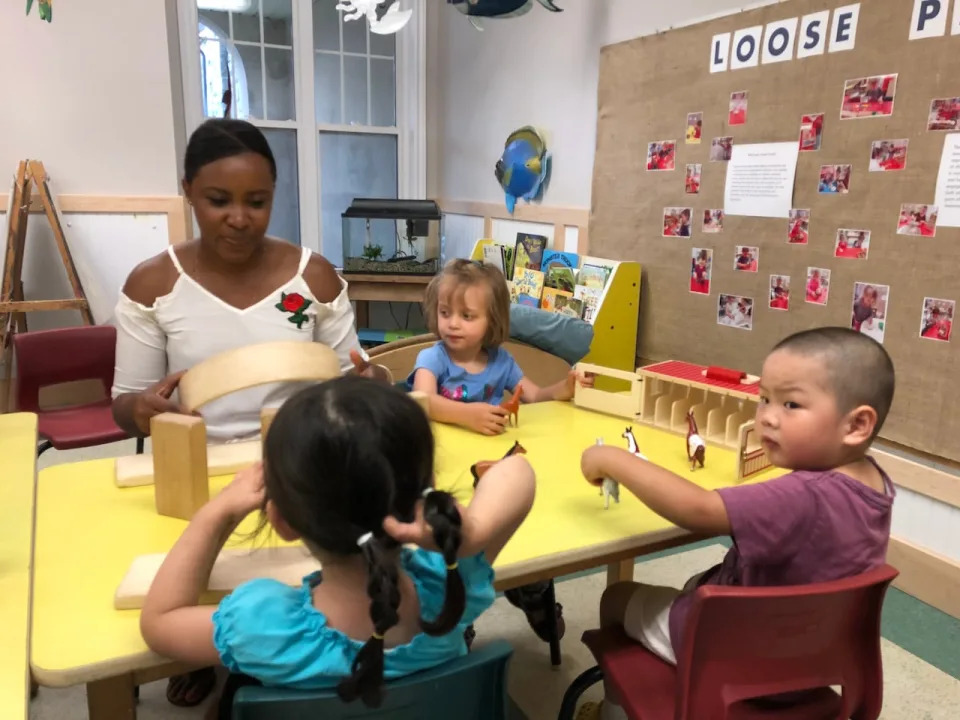
Nova Scotia is grappling with a chronic shortage of child-care spaces. (Jean Laroche/CBC - image credit)
Nova Scotia has not submitted an action plan that would give it access to $123 million in federal funds for child care and early childhood education this year.
Under a 2021 agreement with Ottawa, the province agreed to submit an action plan and progress report at the beginning of the fiscal year in April in order to access federal funds to achieve a goal of a $10 a day child-care fee for parents by 2026.
That agreement, officially called the Canada–Nova Scotia Canada-Wide Early Learning and Child Care Agreement, was signed by then premier Iain Rankin in July 2021.
Federal funding under the agreement would amount to $123 million this fiscal year, $143 million for the next fiscal year and $169 million for the 2025 to 2026 fiscal year.
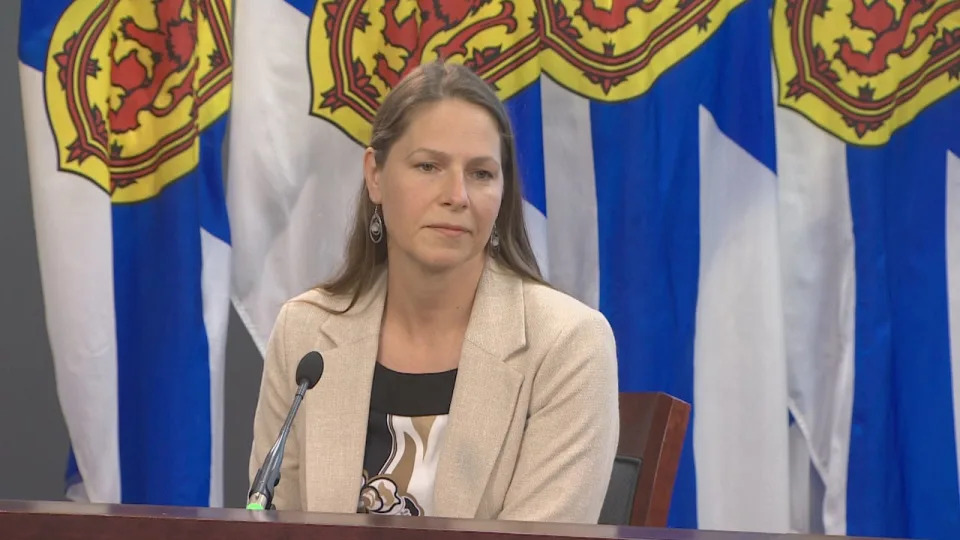
Minister of Education Becky Druhan couldn't tell reporters whether the province plans to ban wait list fees for daycare.
Becky Druhan is the province's minister of education. (Galen McRae/CBC)
Speaking on CBC Radio's Information Morning Nova Scotia, Becky Druhan, the minister of education and early childhood development, said the province is not "leaving any money on the table."
Druhan said wages for early childhood educators have been increased from 14 per cent to 43 per cent, which helps in retaining and attracting workers.
"We still have funds available to do all the work that we're undertaking and that will continue to be available until the new action plan is created and until additional funds flow from the federal government," Druhan said.
"It's not impacting our work at all."
Working on plan
She said the PC government inherited a plan and is trying to create a more resilient system to ensure that Nova Scotians have child-care spaces in their communities that are affordable.
Druhan said the province is working with Ottawa to develop a plan that meets federal and provincial objectives.

Interest in licensed daycares is expected to rise now that the province has reached it's $10 a day child care goal.
Nova Scotia aimed to create 1,500 new child-care spaces last year but only created 400. (Laura Sciarpelletti/CBC)
Kenya Thompson, the co-ordinator of the Nova Scotia chapter of the national organization Childcare Now, which advocates for a publicly funded non-profit child-care system, isn't as enthusiastic about the Houston government's performance.
The province has made progress in fee reductions but not on creating more spaces, Thompson said.
Fell short of target
According to Thompson, the province had a target of achieving 1,500 new regulated child-care spaces last year but only created 400.
She said that goal has now been pushed to the end of this year.
Thompson said she hears government officials say to the media that they inherited a plan and they're working to improve it.
"When we see spaces not being created, when we see a wage grid that's insufficient for ECEs [early childhood educators] to support themselves and it's insufficient to attract workers to the sector, that raises concerns about what that action plan will look like."
Thompson said the bilateral agreement calls for a central organization to be set up to ensure there is inclusive, culturally appropriate and high-quality care provided.
No such organization has been set up, Thompson said, which means a layer of accountability is missing.
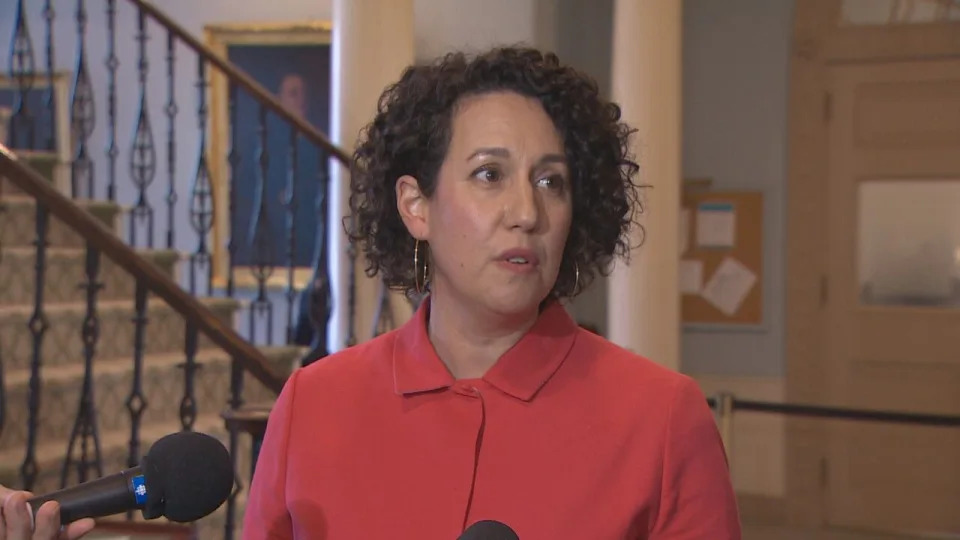
Nova Scotia NDP Leader Claudia Chender at Province House on Wednesday, March 22, 2023. Chender said she thinks all nurses deserve the $10,000 bonus.
Nova Scotia NDP Leader Claudia Chender says while parent fees have decreased and wages have increased modestly, there has not been a significant increase in child-care spaces in the province.
Nova Scotia NDP Leader Claudia Chender shares Thompson's view.
No significant increase in spaces
Chender said while parent fees have decreased and wages have increased modestly, there has not been a significant increase in child-care spaces in the province.
This has been challenging for children who don't have access to early childhood education and to parents who are unable to return to work because there is no child-care space for their children, Chender said.
She said there is a significant amount of federal money to help alleviate the problem that can't be released because the province hasn't submitted an action plan.
"It is deeply confusing and upsetting that the government would not be accessing that funding," Chender said.
"Regardless of the number of interviews that the minister has done, some of which I've heard, she has yet to address this question head-on of why they have not filed the action plan in order to receive the money to use that money to create more child-care spaces."
An Employment and Social Development Canada spokesperson said by email that Ottawa is providing $605 million to Nova Scotia over five years to achieve agreed-upon targets and objectives.
Those targets include reducing fees to an average of $10 a day for licensed child-care and creating 9,500 new licensed spaces by March 2026, according to the email.
'In discussions'
"The Governments of Canada and Nova Scotia are in discussions regarding the action plan," the email states.
"The first instalment for 2023-24 will be provided to Nova Scotia once the requirements outlined in the agreement are met, including the finalization of the Action Plan for 2023-24 to 2025-26."
Thompson said many children in Nova Scotia are missing out on development opportunities in the meantime, and parents are forced to stay home with them and missing out on income.
"It creates a lot of instability and chaos when you don't have access to child care for your child. A lot of parents across the province are really struggling."
No comments:
Post a Comment